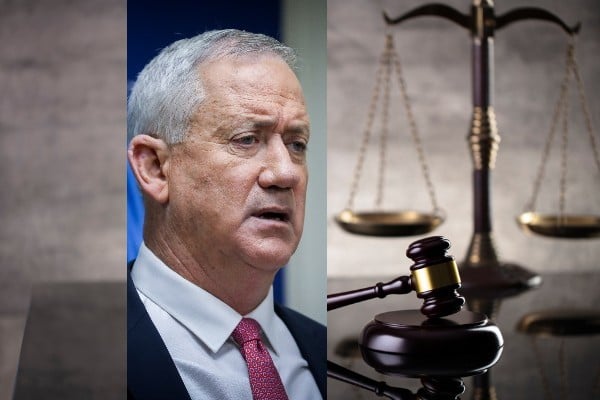Appeals Court’s ruling is huge blow to Palestinian “lawfare” against IDF officers.
By Pesach Benson, United With Israel
In a blow to Palestinian lawfare, a Dutch appeals court in The Hague ruled on Tuesday that Defense Minister Benny Gantz cannot be tried for the deaths of six Palestinians during the 2014 war in Gaza.
The civil suit was filed in 2018 by Ismail Ziada, a Dutch national born in Gaza. He was seeking compensation under Dutch universal jurisdiction laws for the deaths of six family members and a guest who were killed in an Israeli air strike on his home in the Bureij refugee camp. The appeals court’s decision upheld a lower court’s ruling that the Netherlands did not have jurisdiction to hear Ziada’s case. He sought $660,000 in damages.
“Dutch courts are not competent here to judge the claim. The (lower) court rightly decided that,” said the ruling.
“High-ranking military personnel have carried out official policy of the State of Israel, which renders a judgment on their actions moribund.”
The ruling added that Ziada was free to pursue legal action in Israeli courts.
Universal jurisdiction is a concept allowing states to claim jurisdiction over an accused party regardless of where the crime was committed. It assumes that certain offenses, such as genocide, war crimes or crimes against humanity for example, are so serious that states have a duty to prosecute defendants. The concept is not unanimously accepted with critics saying it breaches the fundamental sovereignty of states.
Ziad argued that he could not get a fair trial in Israel for the deaths of the seven, which he called war crimes.
Gantz was the IDF chief of staff during the 2014 Gaza war, known as Operation Protective Edge. Amir Eshel, who commanded the Air Force was named as a co-defendant.
The IDF said that the building housed a Hamas war room and that four members of the Hamas and Islamic Jihad terror groups were also killed in the strike. An investigation carried out by the Military Advocate General’s office determined the strike was both proportionate and necessary. Hamas later confirmed two of its men were in the building at the time.
The Gaza war of 2014 was sparked by the kidnap and murder of three Israeli teenagers near Hebron. During the seven-week conflict, Palestinians fired 4,500 rockets at Israel. The IDF uncovered and destroyed 32 terror tunnels, of which 14 extended into Israeli territory. Palestinian terror groups routinely placed weapons caches, rocket launchers and command and control centers in civilian areas in close proximity to homes, mosques, schools and hospitals.
The practice of politically motivated Palestinian lawsuits is known as “lawfare.”
In many cases the threat of arrest warrants for Israeli officials were just P.R. stunts. But in other instances, the threats were real, forcing former cabinet ministers and IDF officers such as Tzipi Livni, Amir Peretz, Ehud Barak, Shaul Mofaz, Dan Meridor and Doron Almog to alter or cancel travel plans in Britain. The UK amended its universal jurisdiction laws in 2011.
Israeli authorities praised the court’s ruling. “It is a most important legal precedent that safeguards Israel’s military commanders as a whole against similar attempts,” Deputy Attorney General Roy Schondorf tweeted.
Ziad did not indicate if he plans to appeal to the Supreme Court of the Netherlands.























